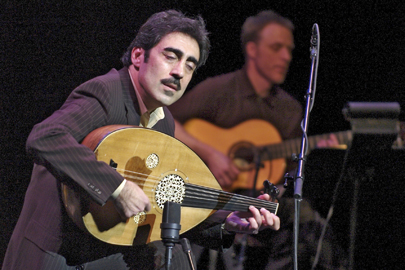Music Unites Us helps translate music, cultures
World-renowned Palestinian oudist Simon Shaheen's campus residency to culminate in March 12 concert at Slosberg Music Center

World-renowned oudist and violinist Simon Shaheen will have a brief residency on campus from March 10 to 12 as part of Music Unites Us, a program designed to further understanding and appreciation of different cultures through music.
"It's important to learn about where the music comes from. Music is surrounded by culture," Shaheen says. "From my experience, students aren't that familiar with countries in the East. They don't even know their location."
The residency, called "Simon Shaheen: Heritage Without Boundaries," includes classroom visits during which Shaheen will share his expertise in music and its connections to culture, and culminates in a Western-style concert on Saturday, March 12, at 8 p.m. in the Slosberg Music Center.
Music professor and program founder Judith Eissenberg starts from scratch each semester. She peruses course listings to find opportunities to mesh curriculum, and works with Waltham Public Schools to extend the experience to more than 1,000 teenagers. But from courses like "Palestinian and Israeli Art, Film and Visual Culture" to "Cross-Cultural Art and Aesthetics," every event includes music.
"There's a kind of knowledge that comes out of performances that words can't get to," says Eissenberg.
Describing the sounds of a foreign culture is one thing, but hearing them is another. To the untrained ear, instruments used in Arab music may sound out of tune. It includes quarter- and eighth-notes, which would register halfway between the black and white keys on piano. The tradition is based on rhythmic structures and melodies, not harmony like Western music, and improvisation is central to the tradition.
| Al-Qantara |
"While you're waiting to hear a harmony that never comes, you can miss the important parts," says Eissenberg.
It is an idea that extends to people and cultures, Eissenberg says, and she hopes Music Unites Us, now in its ninth year, helps students break down walls between themselves and other cultures.
Even Shaheen's primary instrument, the oud, can help open that door. The oud is a classic Middle Eastern stringed instrument and one of the oldest still in existence. The short-necked, pear-shaped wooden instrument is a precursor to the lute. Modern ouds generally have five paired strings, with each pair sharing a pitch. It has no fret board, allowing a wider range of tones, and unlike the flat-backed guitar, the oud's back resembles a watermelon.
The specifics of the oud may be new to students, but they'll quickly understand the skills needed to play them and how they should sound, says Virginia Danielson, the author of "The Voice of Egypt: Umm Kulthum, Arabic Song, and Egyptian Society in the Twentieth Century," who will give a talk prior to Shaheen's concert on Saturday.
"It's not as remote as Peking opera or Australian aborigine, where it challenges your notion of music," says Danielson. "He'll push their understanding and offer something new."
Shaheen says after having lived in the United States for many years, he has a good understanding of how the Western mind thinks, which helps him make the music accessible. He compares the microtones heard in Arab music to Arabic vowels.
"[There are] certain vowels that Americans would have trouble pronouncing," he says. "It's a matter of understanding it and hearing it and practicing it."
Shaheen is well-suited for teaching students about different cultures, having embraced a variety of genres throughout his career. Considered one of the most significant Palestinian musicians of his generation, he founded the Near Eastern Music Ensemble, a group that performs traditional Arab music, nearly 30 years ago.
He's one of only two musicians in the late 20th century to bring Arab music to the Western public, Danielson says. The other is Shaheen's friend Jihad Racy.
| Dance Mediterranea |
In recent years, Shaheen has been playing with Qantara, a band that fuses Arab, jazz, Western classical and Latin American music. Their release "Blue Flame" earned them 11 Grammy nominations and heaps of critical praise.
His musical education goes back to his home of Galilee, where as a five-year-old he began following in the footsteps of his father, a music professor and master oud player.
"When I held and played these instruments, they felt like an extension of my arms," Sheheen has said.
Shaheen studied at the Academy of Music in Jerusalem, where he later taught, and at the Manhattan School of Music and Columbia University. He's released four solo albums, contributed selections for film soundtracks like "Malcolm X" and "The Sheltering Sky," and composed the soundtrack for the United Nations-sponsored documentary "For Everyman Everywhere."
Despite a distinguished career that includes receiving the National Heritage Award at the White House, and playing on such stages as Carnegie Hall, the Kennedy Center or Cairo's Opera House, he still spends about half his time working with college students, in residencies like this one, in workshops and in lectures.
Visit the Music Unites Us website to learn more about the program, find a full schedule of events and ticket information.
Categories: Arts, International Affairs






